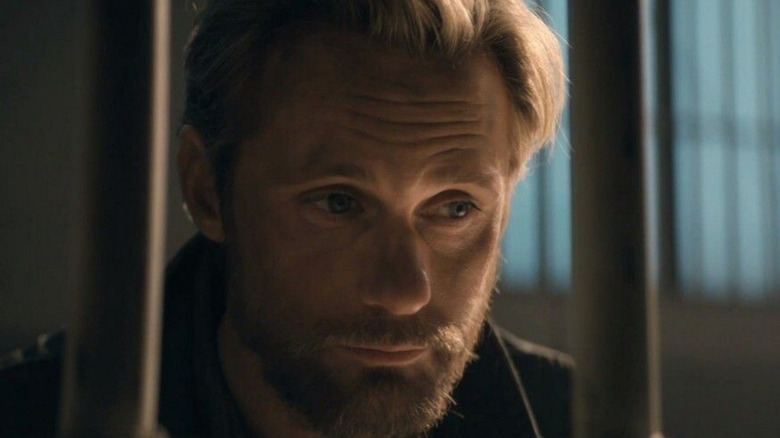The Origin Of Stephen King's Randall Flagg Will Surprise You
Among the pantheon of Stephen King's greatest page-turners, there is a recurring, nefarious force that has crossed paths with a number of characters in the Kingverse, and brought a wave of chaos whenever he did so. From attempting to make his own mad world from the safety of Las Vegas in "The Stand," to being chased down by a lone and determined Gunslinger in "The Dark Tower" series, the character of Randall Flagg — also known as the Walkin' Dude, Marten Broadclock, Raymond Fiegler, and the Man in Black – has been an iconic evildoer that King fans could never get enough of.
But just how did The Ageless Stranger come to life? What dark corner of Stephen King's incredible mind did a wizard in cowboy boots wander out from?
Well, as King has explained when it comes to Flagg's legacy, his legendary antagonist just wandered into town one day and right into a restaurant King was in ... and refused to leave, ever since. In hindsight, it's a typical Flagg move, really.
The Dark Man came to light in King's college years
While he may have become a staple of terror in the world-famous author's numerous tales, King revealed in a 2007 interview with Borders that Flagg appeared to him long before his illustrious career began, and wouldn't budge in all the years that followed. He was in college, eating in a restaurant he described as a "grease pit," when a concept hit him so definitively that he had to write it down on the placemat before him.
"It came to me out of nowhere, this guy in cowboy boots who moved around on the roads, mostly hitchhiking at night, always wore jeans and a denim jacket. I wrote this poem, and it was basically just a page long." This image of a devil in double denim stayed with him long after the poem "The Dark Man" was published in 1969, and continued popping up unexpectedly in other works. What really compelled King, as he tells it, was the idea of an evil figure who could be so charming and personable one minute, while being so utterly vicious on the inside. In the author's words, "The thing about him that really attracted me was the idea of the villain as somebody who was always on the outside looking in and hated people who had good fellowship and good conversation and friends. So, yeah, he was there, really, from the beginning of my writing career. He's always been around."
From "The Stand" onward, the legacy of Flagg stretched across many of King's books and showed the various capabilities of this vicious individual. Able to manipulate the weak-minded and perform multiple forms of magic, Flagg is King's Loki, but nowhere near as lovely as Thor's adoptive brother.

